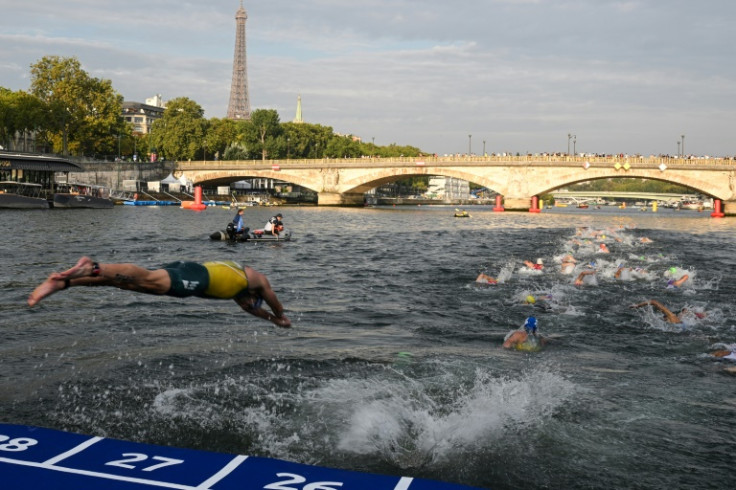
The river Seine is set to be a star feature of the Paris Olympics, but heavy rain, pollution and security fears mean there is still suspense around its role just one month out from the start.
A spectacular July 26 opening ceremony has been planned along the famed waterway -- the first time a summer Games has begun outside the main stadium -- and it will also host open-water swimming and a leg of the triathlon.
But with the clock ticking down, the river is currently flowing too fast for rehearsals and is too dirty for sport.
With currents unusually strong, organisers cancelled the first full practice session for the opening ceremony scheduled for Monday involving all 85 river boats which will carry athletes along a six-kilometre (four mile) route.
"If the flow is too fast, it will pose a serious problem for the opening ceremony," hydrologist Jean-Marie Mouchel told AFP.
After weeks of unusually wet weather, the Seine is high up its banks, with its flow measured at 500 m3/second (18,000 ft3/second) last Friday -- around four to five times higher than its usual level in the summer months.
The heavy rain in May and June has also caused major pollution problems.
French authorities have spent 1.4 billion euros ($1.5 billion) in the last decade trying to clean up the river by improving the Paris sewerage system, as well as building new water treatment and storage facilities.
But major storms still overwhelm the waste water network, some of which dates back to the 19th century, leading to discharges of untreated sewage directly into the river.
Test results published last Friday showed levels of E. Coli -- a bacteria indicating faecal matter -- were often twice as high as the maximum permitted limit for Olympic swimming during the week of 10-16 June.
"There's no doubt that the water quality is not there yet," the top government official for the Paris region, Marc Guillaume, told reporters, while remaining optimistic that dry summer weather would resolve the problem.
The latest readings "are not in line with the standards we will have in the summer," he added.
Paris mayor Anne Hidalgo, who wants to create public swimming spots in the river next year, had to postpone a much-publicised dip to demonstrate its cleanliness on Sunday.
She has promised to take to the water during the week of July 14.
The opening ceremony is also still giving members of France's security forces sleepless nights, given the number of people involved and the difficulty in securing such a large area.
A total of 326,000 people will have tickets to watch the river parade, with hundreds of thousands of others set to spectate from balconies and open windows.
The number of buildings overlooking the river complicates the security operation at a time of heightened fears about terrorism, leading to opposition in the past from senior policing figures.
Snipers will be positioned on the top of every building in the immediate vicinity, with a total of 45,000 security forces set to be deployed.
"The opening ceremony is what's worrying us the most," one senior police figure told AFP recently on condition of anonymity.
Constantly asked about contingency plans in the event of credible threats to the ceremony, Paris 2024 organisers publicly insist there is no alternative to holding it on the river.
Behind the scenes, sources have told AFP that one option is a much-shortened parade which would take place over a bridge in front of the Eiffel Tower.
For the open-water swimming, organisers have flexibility in the schedule, enabling them to delay the event several days in the event of a downpour.
In the worst-case scenario, it would be cancelled and the triathlon would become a duathlon -- just running and cycling -- without the swimming.
Athletes are busy training and trying to ignore the noise.
"Every time there's been problems," French open-water swimming coach Stephane Lecat said last week, referring to last-minute suspense around Guanabara Bay for the 2016 Rio de Janeiro Olympics and concerns about the water quality in Tokyo in 2021.
"There are places around Europe that are a lot worse than the Seine and we swim there every year," he added.








